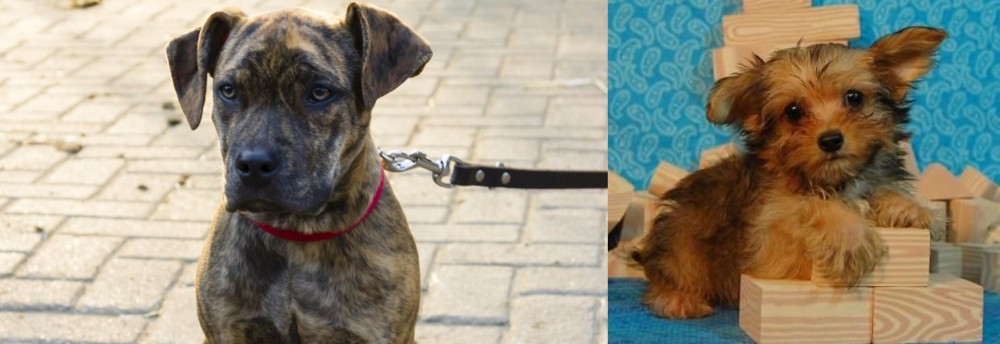 Both Catahoula Bulldog and Yorkillon are originated from United States. Catahoula Bulldog may grow 43 cm / 17 inches higher than Yorkillon. Catahoula Bulldog may weigh 42 kg / 93 pounds more than Yorkillon. Both Catahoula Bulldog and Yorkillon has almost same life span. Catahoula Bulldog may have more litter size than Yorkillon. Catahoula Bulldog requires Low Maintenance. But Yorkillon requires Moderate Maintenance
Both Catahoula Bulldog and Yorkillon are originated from United States. Catahoula Bulldog may grow 43 cm / 17 inches higher than Yorkillon. Catahoula Bulldog may weigh 42 kg / 93 pounds more than Yorkillon. Both Catahoula Bulldog and Yorkillon has almost same life span. Catahoula Bulldog may have more litter size than Yorkillon. Catahoula Bulldog requires Low Maintenance. But Yorkillon requires Moderate Maintenance
Basic Information
Group:
Molosser dogs
Toy dog
undefined
United States
United States
Weight Male:
34 - 46 kg
74 - 102 pounds
Weight Female:
34 - 46 kg
74 - 102 pounds
Life Span:
10 - 16 Years
12 - 14 Years
Other Names:
Olde English Bulldogge
Papa-ShirePapa-Shire • Papiyork • Yorkie Pap Papillon-Yorkshire Terrier Mix, Papillon-Yorkie Mix,
Colors Available:
White, brown, black or grey or be bi-colored - brown and black or white and black
White, brown and white, light brown/golden, dark brown/chocolate, black and brown, black
Coat:
Short and smooth
Straight, medium, fine fine, soft coat
Temperament:
Affectionate, Alert, Cheerful, Courageous, Curious, Energetic, Friendly, Gentle, Independent, Lively, Loving, Loyal, Outgoing, Playful, Protective, Responsive, Social, Stubborn, Sweet, Territorial
Alert, Energetic, Friendly, Loving, Loyal, Playful
Grooming:
Low Maintenance
Moderate Maintenance
New Owners Friendly:
Yes
Yes
History
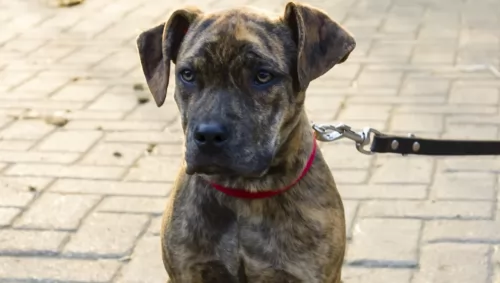 Long ago, ranchers kept the Catahoula Leopard to catch and carry prey, but because it lacked the strength to do so, they would include other stronger dogs in the pack. The American bulldog was more well built, stronger and more aggressive, and the idea was to mix the American Bulldog with the Catahoula Leopard Dog. This brought about the Catahoula Bulldog which has been in existence for some 100 years.
Long ago, ranchers kept the Catahoula Leopard to catch and carry prey, but because it lacked the strength to do so, they would include other stronger dogs in the pack. The American bulldog was more well built, stronger and more aggressive, and the idea was to mix the American Bulldog with the Catahoula Leopard Dog. This brought about the Catahoula Bulldog which has been in existence for some 100 years.
The Catahoula Bulldog became known for its stamina and strength and in 1951 the breed registry started. As a hybrid, the Catahoula Bulldog isn’t officially recognized by the American Kennel Club.
The Yorkillon is a bighearted cross between the Yorkshire Terrier and the Papillon. They are small dogs with huge attitudes and big ears. They are known to be sassy and get into trouble. They are playful, affectionate and intelligent. They were initially developed in the US sometime about 20-30 years ago.
Not recognized by the American Kennel Club as they are considered designer dogs or mixed breeds
Description
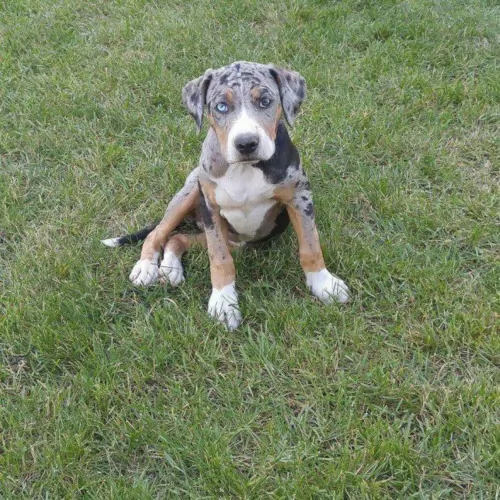 The Catahoula Bulldog is a strong-looking, medium- sized dog of 55-66cm in height and weighing in at 34-46kg. He has a short, smooth, water-repellent coat. The coat can be in a number of colors – white, brown, black or grey or he can be bi-colored such as in brown and black or white and black.
The Catahoula Bulldog is a strong-looking, medium- sized dog of 55-66cm in height and weighing in at 34-46kg. He has a short, smooth, water-repellent coat. The coat can be in a number of colors – white, brown, black or grey or he can be bi-colored such as in brown and black or white and black.
The dog appeals to a lot of people because it sheds very little. The ears of the Catahoula Bulldog are somewhat floppy and the long tail is mostly docked. The dog has unusual eyes and these can be brown, but also in shades of blue or green or even a combination of these colors.
Temperament:
This is a relaxed dog breed but having said that, he is also a protective breed, and then his fearless qualities come out. He becomes alert to strange noises. He is loyal and intelligent and loves to spend time with his human family. He is somewhat stubborn and independent, and early training and socialization should be provided. This ensures he is even more amicable around children in the home as well as around pets.
The Yorkillon is a small dog that can look like a Yorkie or a Papillon but most due have large ears like the Papillon. Both parent breeds have long hair and short legs. There is still a lot of first generation breeding, but most are now products of multigenerational breeding. This means that every puppy can look different and no two are likely to look the same.
Characteristics
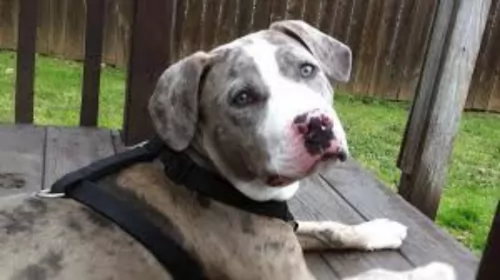 The Catahoula Bulldog is such an all-round dog breed – he loves to work and be active but he also loves to be with his human family. He is smart, active, loving and devoted and makes a splendid working dog or human companion, though he will always need to be kept busy.
The Catahoula Bulldog is such an all-round dog breed – he loves to work and be active but he also loves to be with his human family. He is smart, active, loving and devoted and makes a splendid working dog or human companion, though he will always need to be kept busy.
He is a healthy dog breed too, and is actually low maintenance which is just one of the many advantages of keeping him as a pet.
For all that he offers you, it is up to you as a responsible dog owner to provide him with a loving and nurturing environment so that he can continue to live up to the high standards this dog breed is known for.
1.Children friendliness yes but be careful the children do not hurt the small dogs. This is particularly true regarding the risk of tracheal collapse.
2.Special talents – loves to do tricks
3.Adaptability – can live anywhere in an apartment as well as a home, but he would prefer to have a fenced yard to run in.
4.Learning ability – extremely smart and very obedient
Health Problems
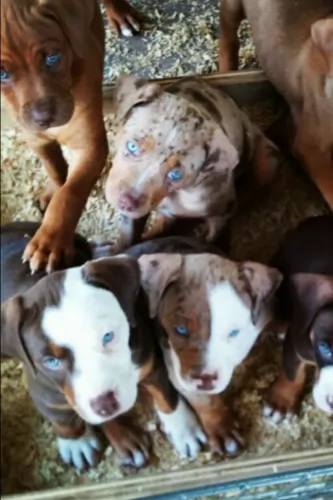 The Catahoula Bulldog is known to be a robust dog breed, full of energy. With good care – healthy diet, clean, fresh water and love and attention – he can live up to be between 10 and 16 years of age.
The Catahoula Bulldog is known to be a robust dog breed, full of energy. With good care – healthy diet, clean, fresh water and love and attention – he can live up to be between 10 and 16 years of age.
However, with every dog breed there will be some common dog ailments to watch for and these include hip dysplasia, some eye disorders and congenital heart defects. Some Catahoula Bulldogs can become deaf in one ear, or blind in one eye.
There are not a lot of hereditary health issues but there are some issues they can be prone to:
• Patellar Luxation – slipped knee caps can lead to lameness.
• Epilepsy – can be treated with medication.
• Diabetes – can be treated with medication
• Legg Calve Perthes Disease – blood disorder affecting hind leg bones.
• Heart defects
• Tracheal collapse
• Hip dysplasia – can cause lameness.
Caring The Pet
Exercise:
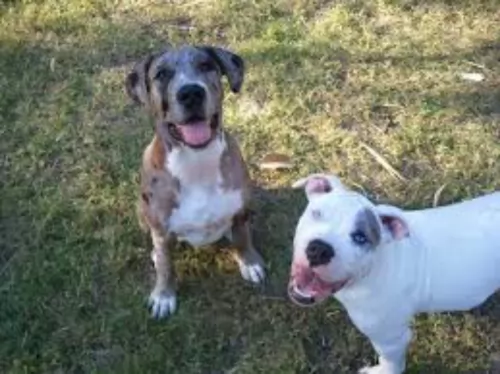 The energy levels of the Catahoula Bulldog are high and he is going to need ongoing mental- and physical stimulation. He wants to be part of all the activities in the family and you will need to take him for walks or take him with you when you go cycling or jogging. He’ll love to join in with all kinds of ball games.
The energy levels of the Catahoula Bulldog are high and he is going to need ongoing mental- and physical stimulation. He wants to be part of all the activities in the family and you will need to take him for walks or take him with you when you go cycling or jogging. He’ll love to join in with all kinds of ball games.
The best kind of environment for the Catahoula Bulldog is a country home with lots of fields to run in, but if you keep him in the city, he can do well provided you make sure to include plenty of daily exercise activities for him.
Grooming:
The short, smooth coat of the Catahoula Bulldog won’t require much grooming, so a good brush twice a week will be excellent for this dog who will just love the interaction this activity brings.
Diet:
Ensure that your Catahoula and Bulldog mix has food which is full of vitamins and minerals as he is an energetic dog. If you make use of a commercially manufactured product, make sure it is one of the top quality ones guaranteed to ensure good health.
Don’t just put a bowl of dog pellets in front of your dog day after day, but make it interesting and nutritious for your pet by adding in raw meat, rice, vegetables and some cooked meat from time to time. An adult dog can be fed once or twice a day.
Always ensure fresh, cool water is constantly available to your pet.
1.Feeding the puppy Feed a high quality toy puppy food 3-4 meals per day a total of ¼ cup for the day.
2.Feeding the adult Feed a high quality toy puppy food 1-2 meals per day a total of ½ cup for the day.
3.Points for Good Health – No inherited issues.
4. Games and Exercises – These are high energy dogs as both parent breeds are such. They need to run, love having a fenced yard, 15-20 minute walks per day.
Comparison with other breeds
- Catahoula Bulldog vs English Bulldog - Breed Comparison
- Catahoula Bulldog vs German Shepherd - Breed Comparison
- Catahoula Bulldog vs Golden Retriever - Breed Comparison
- Catahoula Bulldog vs Labrador Retriever - Breed Comparison
- Catahoula Bulldog vs West Highland White Terrier - Breed Comparison
- Catahoula Bulldog vs French Bulldog - Breed Comparison
- Catahoula Bulldog vs Beagle - Breed Comparison
- Catahoula Bulldog vs Yorkshire Terrier - Breed Comparison
- Catahoula Bulldog vs Poodle - Breed Comparison
- Catahoula Bulldog vs Rottweiler - Breed Comparison
- Catahoula Bulldog vs Boxer - Breed Comparison
- Catahoula Bulldog vs English Pointer - Breed Comparison
- Catahoula Bulldog vs Siberian Husky - Breed Comparison
- Catahoula Bulldog vs Doberman Pinscher - Breed Comparison
- Catahoula Bulldog vs American Bully - Breed Comparison
- Catahoula Bulldog vs Abruzzenhund - Breed Comparison
- Catahoula Bulldog vs Affenpinscher - Breed Comparison
- Catahoula Bulldog vs Afghan Hound - Breed Comparison
- Catahoula Bulldog vs Aidi - Breed Comparison
- Catahoula Bulldog vs Airedale Terrier - Breed Comparison
- Catahoula Bulldog vs Akbash Dog - Breed Comparison
- Catahoula Bulldog vs Akita - Breed Comparison
- Catahoula Bulldog vs Africanis - Breed Comparison
- Catahoula Bulldog vs Askal - Breed Comparison
- Catahoula Bulldog vs Atlas Terrier - Breed Comparison
- Yorkillon vs English Bulldog - Breed Comparison
- Yorkillon vs German Shepherd - Breed Comparison
- Yorkillon vs Golden Retriever - Breed Comparison
- Yorkillon vs Labrador Retriever - Breed Comparison
- Yorkillon vs West Highland White Terrier - Breed Comparison
- Yorkillon vs French Bulldog - Breed Comparison
- Yorkillon vs Beagle - Breed Comparison
- Yorkillon vs Yorkshire Terrier - Breed Comparison
- Yorkillon vs Poodle - Breed Comparison
- Yorkillon vs Rottweiler - Breed Comparison
- Yorkillon vs Boxer - Breed Comparison
- Yorkillon vs English Pointer - Breed Comparison
- Yorkillon vs Siberian Husky - Breed Comparison
- Yorkillon vs Doberman Pinscher - Breed Comparison
- Yorkillon vs American Bully - Breed Comparison
- Yorkillon vs Abruzzenhund - Breed Comparison
- Yorkillon vs Affenpinscher - Breed Comparison
- Yorkillon vs Afghan Hound - Breed Comparison
- Yorkillon vs Aidi - Breed Comparison
- Yorkillon vs Airedale Terrier - Breed Comparison
- Yorkillon vs Akbash Dog - Breed Comparison
- Yorkillon vs Akita - Breed Comparison
- Yorkillon vs Africanis - Breed Comparison
- Yorkillon vs Askal - Breed Comparison
- Yorkillon vs Atlas Terrier - Breed Comparison
 Petzlover
Petzlover Both Catahoula Bulldog and Yorkillon are originated from United States. Catahoula Bulldog may grow 43 cm / 17 inches higher than Yorkillon. Catahoula Bulldog may weigh 42 kg / 93 pounds more than Yorkillon. Both Catahoula Bulldog and Yorkillon has almost same life span. Catahoula Bulldog may have more litter size than Yorkillon. Catahoula Bulldog requires Low Maintenance. But Yorkillon requires Moderate Maintenance
Both Catahoula Bulldog and Yorkillon are originated from United States. Catahoula Bulldog may grow 43 cm / 17 inches higher than Yorkillon. Catahoula Bulldog may weigh 42 kg / 93 pounds more than Yorkillon. Both Catahoula Bulldog and Yorkillon has almost same life span. Catahoula Bulldog may have more litter size than Yorkillon. Catahoula Bulldog requires Low Maintenance. But Yorkillon requires Moderate Maintenance Long ago, ranchers kept the Catahoula Leopard to catch and carry prey, but because it lacked the strength to do so, they would include other stronger dogs in the pack. The American bulldog was more well built, stronger and more aggressive, and the idea was to mix the American Bulldog with the Catahoula Leopard Dog. This brought about the Catahoula Bulldog which has been in existence for some 100 years.
Long ago, ranchers kept the Catahoula Leopard to catch and carry prey, but because it lacked the strength to do so, they would include other stronger dogs in the pack. The American bulldog was more well built, stronger and more aggressive, and the idea was to mix the American Bulldog with the Catahoula Leopard Dog. This brought about the Catahoula Bulldog which has been in existence for some 100 years. The Catahoula Bulldog is a strong-looking, medium- sized dog of 55-66cm in height and weighing in at 34-46kg. He has a short, smooth, water-repellent coat. The coat can be in a number of colors – white, brown, black or grey or he can be bi-colored such as in brown and black or white and black.
The Catahoula Bulldog is a strong-looking, medium- sized dog of 55-66cm in height and weighing in at 34-46kg. He has a short, smooth, water-repellent coat. The coat can be in a number of colors – white, brown, black or grey or he can be bi-colored such as in brown and black or white and black. The Catahoula Bulldog is such an all-round dog breed – he loves to work and be active but he also loves to be with his human family. He is smart, active, loving and devoted and makes a splendid working dog or human companion, though he will always need to be kept busy.
The Catahoula Bulldog is such an all-round dog breed – he loves to work and be active but he also loves to be with his human family. He is smart, active, loving and devoted and makes a splendid working dog or human companion, though he will always need to be kept busy. The Catahoula Bulldog is known to be a robust dog breed, full of energy. With good care – healthy diet, clean, fresh water and love and attention – he can live up to be between 10 and 16 years of age.
The Catahoula Bulldog is known to be a robust dog breed, full of energy. With good care – healthy diet, clean, fresh water and love and attention – he can live up to be between 10 and 16 years of age. The energy levels of the Catahoula Bulldog are high and he is going to need ongoing mental- and physical stimulation. He wants to be part of all the activities in the family and you will need to take him for walks or take him with you when you go cycling or jogging. He’ll love to join in with all kinds of ball games.
The energy levels of the Catahoula Bulldog are high and he is going to need ongoing mental- and physical stimulation. He wants to be part of all the activities in the family and you will need to take him for walks or take him with you when you go cycling or jogging. He’ll love to join in with all kinds of ball games.